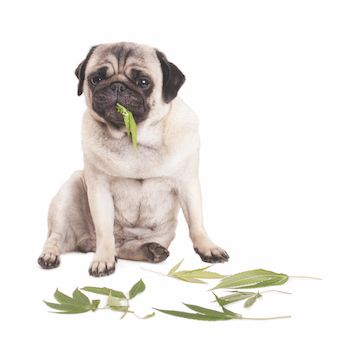Marijuana Toxicity on the Rise Among Pets
Veterinarians are reporting a significant increase in the number of patients being treated for marijuana intoxication.

Recently, the story of Jennifer Gunter, MD, and her Labrador retriever, Hazel, has made national news. On July 5, Dr. Gunter took to Facebook to share her story: She and Hazel had gone for a run through their California town in late afternoon, after which Hazel was left at home while Dr. Gunter went shopping. Upon her return that evening, she noticed that Hazel could not support her own weight and was drifting in and out of consciousness and twitching uncontrollably.
After bringing Hazel to a veterinary clinic, it was discovered the dog was suffering from marijuana poisoning. Dr. Gunter now believes Hazel ate something while on their run earlier that day. Dr. Gunter also relayed that her veterinarian told her that their clinic sees 10 similar cases each week.
RELATED:
- Medical Marijuana Research Remains Top Priority for Veterinarians
- Medical Marijuana in People and Pets: History, Controversy, and the Future
While Dr. Gunter’s story has garnered mixed responses on Facebook, it does not represent an isolated incident. Veterinarians around the country are reporting a significant increase in the number of pets—mostly dogs—being treated for marijuana intoxication. The Pet Poison Helpline also reported a 448% increase in marijuana cases over the past 6 years, with the majority involving pets that had ingested marijuana-laced food products.
An Ongoing Trend
This isn’t the first time the veterinary professionals have called attention to the increased incidence of pot poisoning. A retrospective study from 2012 published in the Journal of Veterinary Emergency and Critical Care evaluated the trends in marijuana toxicosis in dogs living in a state with legalized medical marijuana.
The investigators analyzed 125 client‐owned dogs in Colorado that had presented for known or suspected marijuana toxicosis at 1 private specialty referral hospital and 1 university teaching hospital from 2005 through 2010. During this time period, medical marijuana was legal but recreational use was not.
Study results showed a significant correlation between the number of medical marijuana licenses and marijuana toxicosis cases seen at the 2 hospitals. While the vast majority of dogs included in the study recovered, the ingestion of baked goods made with medical-grade tetrahydrocannabinol (THC) butter resulted in 2 deaths.
“The incidence of marijuana toxicosis presenting to both hospitals increased 4‐fold, while the number of people registered for medical marijuana in the state increased 146‐fold in the last 5 years,” the authors wrote.
What Can Veterinarians Do?
Although the pet care market is booming with products promoting the benefits of cannabidiol, poisoning becomes a risk when pets ingest THC. Because marijuana intoxication is still relatively new to the veterinary community, it’s important that veterinarians and their support staff familiarize themselves with the possible presenting signs:
- Ataxia
- Body tremors
- Drooling
- Bradycardia
- Hypothermia
- Incontinence
- Seizures
- Tachycardia
The American Veterinary Medical Association recently published a document for its members, Cannabis: What Veterinarians Need to Know, to help veterinarians advise clients and treat patients that may have been exposed. This document includes information on the legal status of medicinal marijuana use in veterinary medicine, marijuana risks to pets, clinical signs and treatment of acute toxicosis, and the effects of chronic marijuana exposure. The group is also hosting a free 1-hour webinar on the topic on August 23 at 7 p.m. (EST).